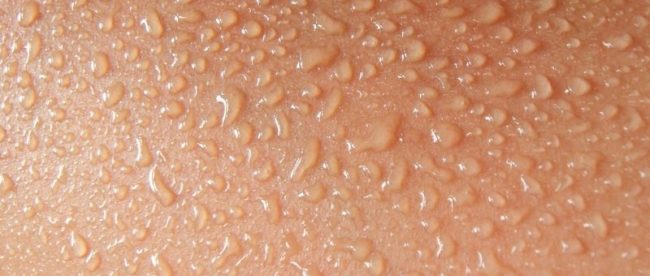Sweat A LOT On Your Keto Diet? Here’s What It Means

When you start a new diet, your body is going to face some changes. Whether you are reducing your calories or cutting out a food group like carbohydrates, the body will notice. These changes might not be too invasive, but it is helpful to look out for them and keep yourself informed. It is also a good idea to consult your doctor before going on a new diet.
If you are a beginner on the keto diet, you might feel a whole host of new changes in your body, such as sweating a little too much. This probably prompted the question, “Why am I sweating on a keto diet?” and “What is the link between keto and sweating?”
Do you have a particular question about reasons for sweating on keto? Then use the table of contents below to jump to the most relevant section. And you can always go back by clicking on the arrow in the right bottom corner of the page. Also, please note that some of the links in this article may be affiliate links. For more details, check the Disclosure section at the bottom of the page.
Does ketosis cause sweating?

Ketosis causes quite a few changes in the body. Some people report “keto flu,” and others may experience fatigue, headaches, and increased heart rate. Another change may also be weight loss, the primary motivation for many people getting on the keto train.
But weight loss is not the only benefit of ketosis. Ketosis was initially created by scientists to treat epilepsy in children. It can also boost cognitive or brain function. It can clear brain fog and make you experience sharpness and clarity.
So to answer the question: Does ketosis cause sweating? Yes, ketosis is the process that is causing your night sweats – the keto diet can cause that.

Main reasons why we are sweating on a keto diet
You are sweating on ketosis because your body is producing ketones. What are ketones? These are a source of energy in the body. When you stop eating carbs, your body produces ketones to use for fuel. These ketones go to the brain, heart, and other muscles so you can do all your daily activities successfully.

One of the ketones in the body is called acetone. Acetone is important to learn about because it is excreted from the body through urine, sweat, and your breath. When you are on the keto diet sweating, it means that acetone is leaving your body. Low carb diets apart from keto can also cause low carb diet sweating.
If you are a fan of nail polish, then you have heard of acetone. It is used to remove nail polish. That’s why some people may smell nail polish on their breath, sweat, and urine. All this is due to acetone – a ketone also found in the body.
Another reason why you are sweating on a keto diet is due to the keto flu. This is a flu that many keto dieters may face in the first few weeks of the keto diet. This flu may also cause ketosis sweating. The keto flu is caused because your body has not yet used ketones and fats for fuel. This process is called keto-adaptation or fat adaptation.

Keto adaptation sweating
Your body is going to start sweating due to a change in diet. You always use carbohydrates for fuel on a regular diet. In fact, you have probably been using carbs all your life. Suddenly, you aren’t using carbs anymore. It’s no matter – your body is smart enough to get the liver to produce ketones to supply your energy.
Using ketones and fats for energy is something your body can do quite easily in the short term. This is the science behind intermittent fasting, as some people do. However, when you keep going for more than a few days, your body will start to adapt to the new normal. This is when sweating starts. Ketosis sweating won’t last forever – it is just until your body gets into the groove of using ketones and carbs.


Being in ketosis and sweating at night
Another big change in people doing ketosis is that you might start sweating at night. Sweating at night due to ketosis is no fun. Imagine waking up in the middle of the night due to drenched sheets! There are many causes of night sweats, like anxiety, sickness, and hormonal changes. However, ketosis also causes its unique blend of night sweats.
The cause of keto night sweats lies in the chemical reactions caused by not eating carbohydrates. It leads to nocturnal hypoglycemia, dehydration, and sugar withdrawals that must be countered by the body by night sweats. Nocturnal hypoglycemia refers to the fall of blood glucose levels while you sleep.
Dealing with ketosis night sweats is a matter of letting them pass. You can cope with night sweats by wearing loose-fitting clothing, ventilated sheets like linen, and even laying a towel down before you sleep. Ketosis night sweats leave on their own after some time when your body gets used to ketones and fats.


How to deal with sweating a lot on keto?
Some of these symptoms will go away on their own. However, it is up to you to learn to cope with them while they last. These are just some suggestions to consider to help you feel better when you are keto sweating.
Drink electrolytes
Electrolytes are minerals that help with hydration, muscle contraction, and pH balance. Ketosis sweating can cause loss of essential minerals, and drinking an electrolyte drink can bring your body back to its normal energy levels. Coconut water is a great keto electrolyte drink.
Avoid spicy food

Spicy food can cause more sweating than usual while on the keto diet. If you find that adding spices like paprika and turmeric causes you to sweat more, then you will need to stay off them for a while. Substitute dry spices with fresh herbs like garlic.
Thanks for the graphics: Canva.com

Disclosure: At vegketodiet.com I only mention the products that I researched and considered worthy. But it’s important to note that we are a participant of several affiliate programs, including but not limited to VigLink and Amazon Services LLC Associates Program. As an Amazon Associate, this website earns from qualifying purchases. Also please note that I am not a doctor. As such readers are strongly recommended to make decisions that might affect their health by doing their own research. At vegketodiet.com I only document and describe thoughts, researches and ideas that proved to be working for me.

